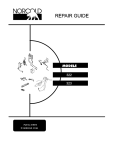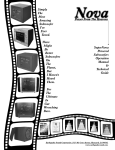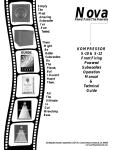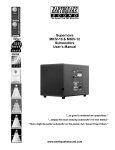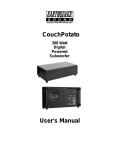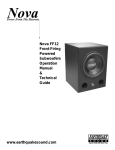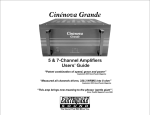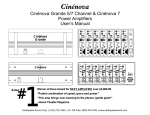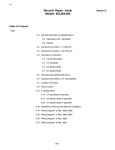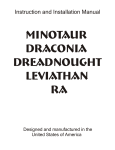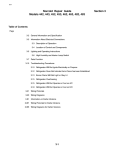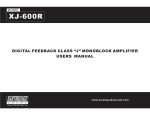Download EarthQuake DB-10 Operator`s manual
Transcript
Sound That Will Move You SuperNova MKV Subwoofer Operator’s Manual “Simply The Most Amazing Subwoofer I've Ever Tested.” “There Might Be Better Subwoofers On The Planet, But I Haven’t Heard Them.” “For The Ultimate In Gut Wrenching Bass.” On A Personal Note... Dear Valued Customer, Welcome to the eclectic world of Earthquake High Fidelity sound systems; you are about to experience the SuperNova MKV subwoofer. This system is designed to dramatically enhance your enjoyment of music and films at home by adding power and impact to low frequency sound effects. Earthquake Sound Corporation is located in the heart of the Silicon Valley. It specializes in manufacturing high end home and car audio products ranging from the smallest driver to the loudest subwoofer system. In its dedication to excellence, Earthquake has maintained extensive programs in research and development to provide you with the highest quality audio products. This owner’s manual is designed to better acquaint you with the SuperNova MKV subwoofer system and to guide you through the phases of system design and application. It is imperative that you read this manual in its entirety. EARTHQUAKE technicians and staff look forward to answer any questions you might have, please call (1-800-576-7944). CAUTION: the SuperNova MKV is capable of generating high sound pressure levels. You should exercise caution when operating this subwoofer system. Long term exposures to high levels of sound pressure will cause permanent damage to your hearing. Sound pressure levels exceeding 85dB can be dangerous with constant exposure. Set your audio system to a comfortable loudness level. The SuperNova MKV subwoofer system is designed to generate high levels of low frequencies (110 dB to 128 dB at 15 Hz to 20 Hz) and this will transmit a tremendous amount of vibration into walls, shelves and the structure; thus causing sheet rock flexing, glass and other objects to fall off shelves. Earthquake Sound Corporation does not assume liability for damages resulting from the direct use of the SuperNova MKV, and urges users to play the SuperNova MKV in moderate levels. Joseph J. Sahyoun - President and inventor of the SLAPS - proudly showing off a SLAPS12 at one of the SuperNova assembly lines. Safe & Proper Handling Of Your SuperNova The SuperNova MKV subwoofer system weighs over 80 Lbs. It is considerably heavy for an average person to carry or maneuver. To prevent injuries and eliminate any possible damage to your SuperNova MKV, we encourage you to employ the help of a friend when unpacking the unit; further we suggest the following: #1. Always wear a back support belt when carrying / lifting the SuperNova MKV. #2. If possible, get someone to help you move the SuperNova MKV. #3. Do not apply pressure or push against the face of the speaker; this will cause irreparable damage to the cone and suspension. #4. When carrying the SuperNova MKV, make sure that the speaker is on the other side, away from your chest (eliminating the chance of pushing against the face of the speaker). #5. Do not drop the SuperNova MKV or subject it to sudden shocks. This will damage the external finish and weaken the enclosure, creating air leaks. #6. Avoid exposing the SuperNova MKV to moisture. Water will damage the wood structure as well as the amplifier and speakers. #7. Cleaning the SuperNova MKV is best done using soft cloth; if needed, use mild detergent with water. Like with any other electrical unit, always unplug the MKV before cleaning it. Unpacking Your SuperNova The SuperNova MKV is double boxed for product safety. We highly suggest having a padded surface and at least two (2) people to safely unpack the SuperNova MKV. Step 1 On a padded surface, carefully place the box on its side to remove the bottom packing tape and staples. Step 2 Without tilting the box too much, tug the bottom flaps outward and keep the protective foam in place. Step 3 Gently reposition the box upright. Step 4 Slide the box off, minding the protective foam on the top, bottom, and sides of the subwoofer. SLAPS. What Makes A SuperNova? Premium Earthquake Subwoofers Every component of an Earthquake driver is designed for accurate reproduction of bass and sub-bass frequencies. With a massive moving structure, these subwoofers operate with extremely low distortion and impressive transient response. Their performance is attributed to a non-conventional motor structure design that integrates components such as: * Double stacked, high-gauss magnets, with a total height of 1.5 inches * Over 7 inch (D), epoxy coated super spider. Chill-plated for long lasting linear performance * 3” diameter, high temperature voice coil, with 1.85” copper winding (height) * 1.5” thick, single layer, thermally pressed poly-ether foam surround Telling The Difference Between The Passive and Active Drivers 10” models: The 10” SuperNova MKV has a deep-cone active driver with the Earthquake logo on the front of it. Its SLAPS passive radiator is flat and has no logo. 12” and 15” models: Both of these models use flat active drivers and passive radiators which both look almost identical. But they are not; the one with the bolt head in the center is the SLAPS passive radiator. The SuperNova subwoofer structure allows high excursions (19 to 21mm) without physical deformation or running out of Reactive Electromagnetic Coupling. SLAPS Besides its many advanced features, the SuperNova MKV is armed with the Symmetrically Loaded Audio Passive System SLAPS (patented by Earthquake Sound Corporation). The SLAPS is capable of moving more than 4” peak to peak at 15Hz. More air movement translates to higher SPL; the new passive system adds an excess of 5dB at 15Hz, that is more than twice as loud at that frequency. How is that possible? Current passive woofer technology relies upon non linear, limited movement suspension. In contrast, the SLAPS employs dual (identical) suspensions, allowing the passive driver to move the same amount of air in either direction. Further, the components used to build the suspension allow for long excursions with no physical deformation or limitations. THX Standards... One Octave Lower! The SuperNova MKV performance exceeds THX requirements of 105 dB at 30 Hz by far... In flat mode, it achieves 123 dB at 30 Hz and reaches upwards of 128 dB when the bass boost from an audio processor (source) is used. More impressive is its capability to dish out 108 dB at 15 Hz and near 100 dB at 10 Hz as shown in the graphs below. Keep in mind that typical subwoofer systems fail to reproduce frequencies below the 20 Hz mark. Brace yourself and everything else in the room... This SuperNova will extend the already flat, accurate, and on-time low frequency response to deeper levels where no other subwoofers have gone before. It can put out enough bass energy to fill even large rooms with sonic rumbling. The SuperNova MKV delivers an impressive amount of features aimed at fulfilling the promise of groundshaking bass, as suggested by its name. SLAPS used in SuperNova MKV are tuned by adding mass to the structure of the passive radiator. Steel cylinders are used to tune the SLAPS to the desired frequency. Corner Loading = + 9 Decibels Of Free Power Fact: Subwoofers reproduce frequencies with wavelengths that are long in relation to the dimensions of most living rooms. Standing waves will boost or cancel various frequencies due to the interaction with the room boundaries. Moving a subwoofer in a room will change what you hear in the listening position a lot. For maximum bass reinforcement, the SuperNova MKV system should be placed in the corner of your living room with the subwoofers facing the wall. This creates acoustical coupling with the walls, which in turn leads to a 9 decibels of boost in the overall response of the Supernova. Keep a 3" clearance between the subwoofer and the walls. Fine tuning the SuperNova MKV requires adjustments to the crossover point, volume control and the phase switch. These controls are located on the side of the enclosure. For ease of tuning, we recommend that you turn the SuperNova MKV around to expose the controls, and place it in position (corner). Set your stereo system to a moderate listening level and adjust the SuperNova MKV accordingly. The SuperNova MKV is equipped with a 24 dB/Oct. low pass filter designed to eliminate vocals from entering the system. When tweaking, gradually reduce the crossover point setting to eliminate vocals from seeping into the amplifier. Positioning Options Corner Loading will give you an added 6 to 9 decibels of sound pressure; also it reduces the level of vocals - if present - emitted from the subwoofer. We recommend that the active subwoofer face the listener, while the passive faces the wall (corner). Keep a clearance of 5” to 7” between the SLAPS and the wall - remember that the SLAPS can travel up to 4”. Consider that room permissibility plays a big role in positioning. One thing is certain, achieving a perfect subwoofer setup in your living room will require time and experimentation. When used for special effects reinforcement (10Hz to 40Hz range), the SuperNova MKV fares well in corner loading position; as corner loading naturally boosts the subharmonic frequencies by 9dB. Corner Loading is recommended for movies and sound tracks effects. SUPERNOVA MKV Used with music (10Hz to 100Hz), it is recommended that the SuperNova MKV is placed in a corner, yet it can be placed in a centered position. By using two MKV subwoofer systems (one in each corner), corner loading effects can be achieved without disturbing the balance of front stereo images. MKV Widescreen CORNER LOADING Viewing position Alternative Subwoofer Placement Options SUBWOOFER LFE SUBWOOFER LFE+L SUBWOOFER LFE+R SUBWOOFER LFE+L SUBWOOFER LFE+R SUBWOOFER LFE Four (4) MKV Arrangement More bass in the right places Two (2) MKV Arrangements - Seating Based Placing the two subwoofers on the horizontal axis of the seating area SUBWOOFER LFE SUBWOOFER LFE SUBWOOFER LFE Two (2) MKV Arrangements - Seating Based Placing the two subwoofers on the vertical axis of the seating area Corner Loading Placement Ideally, place the seating about 2/3 of the room away from the television. Surround System Placement Surround speakers are there to envelop three dimensional sound that places you in the middle of the action. Ideally, your primary pair of surround speakers should be placed to the left and right of your listening position — either in line with it, or just behind it. They should form a 90°-110° angle with respect to your television. In a 6.1-channel or 7.1-channel system with more than two surround speakers, or if side placement is not available for your surrounds in a standard 5.1-channel setup, consider placement behind your listening position, facing the front of the room. Surround speakers should be placed high enough so that the drivers do not fire directly at your ears when you’re sitting down. As a rule of thumb, place them at ear level while you are in standing position. Most people tend to over amplify the rear speakers. This is not recommended as it can overpower the front speakers. Most of the time, the rear speakers are relatively quiet. They simply come on when there are special effects. Since every room has different acoustics, you might need to experiment with the speakers aiming. You may get good results by pointing them at the ceiling or toward the rear corners of the room. If no side or rear walls are available for mounting your speakers, try placing a pair of traditional bookshelf speakers on speaker stands, slightly behind and to the sides of your listening position. Avoid aiming them directly at your listening position. You may also try any of our Sweet spot, IQ Series and Imãge in-ceiling speakers. FR T ON FR ON T CENTER 0° FT LE 25° - 30° RIG HT 25° - 30° 90° - 110° 90° - 110° REA R REA R RIGH LEFT T MKV SUBWOOFER REAR CENTER Speaker Placement in 6.1 System Position the rear center speakers behind from the primary listening/seating spot and at about 6 feet from the floor. Placing the MKV subwoofer close to the listening/seating spot delivers more vibrations and subharmonics. FR T ON FR T 25° - 30° 0° FT LE 25° - 30° LE ON CENTER T 0° FT FR T ON FR ON CENTER RIG HT 25° - 30° RIG HT 25° - 30° 90° - 110° 90° - 110° SURROUND SURROUND 90° - 110° 90° - 110° RIGHT LEFT REA R REA 135° - 150° EA FT LE T H IG R MKV SUBWOOFER R T 135° - 150° R EA RIGH LEFT MKV R R R SUBWOOFER Speaker Placement in 5.1 System Position the rear left and right speakers 90° - 110° across from the primary listening/seating spot and at about 6 feet from the floor. Speaker Placement in 7.1 System Position the left and right surround speakers at 90°angle and the left and right rear speakers at 135° - 150°angle with respect of the television and about 6 feet from the floor. MKV’s BA-212 Amplifier The SuperNova MKV subwoofer is hand assembled using high density fiber boards. The cabinet is crafted to exact tolerance for near nil vibration. The SUPERNOVA's unsurpassed performance stems from: Class “D” Amplifier HIGH LEVEL SuperNova MK-V Right Left Power 24dB/Oct ON Perfect to feed a center channel amp. OUT OFF IN LOW LEVEL Remote Remote eye input Volume Manual volume control U.S. PATENTS: #6044925, #6460651, #10/058868, #78/175574, #78/175565, and other patents pending. X-over Freq. Phase Variable, 24dB per octave, low pass filter. Range 50Hz-150Hz. Recommended general setting at 2 o'clock position Signal detection circuitry. When the toggle switch is in the ON position the subwoofer is in AUTO ON/OFF mode. When in the OFF position the amplifier is shut down completely and must be turned on manually for operation. NOTE: When the subwoofer is on the power LED will remain glowing red at all times. It is not an indicator for failure etc. Sound That Will Move You. WWW.EARTHQUAKESOUND.COM Fuse holder with two replacement 10 ampere fuses *600 watts class “D”, high efficiency (99%) power amplifier *Optical Distortion Limiting circuitry (ODL). A patented process that converts the analog audio signal to light and optically couple it to the driver stage. When users set the gain too high, the ODL prevents the amp from clipping; thus limiting distortion to near nil levels *24 dB / Octave variable filter from 50 Hz to 150 Hz *Low level inputs/outputs *High level inputs/outputs *Auto Signal Sensing *0-180º Phase Switch *Volume Control *Vari-position remote control sensor allows users to position the remote eye anywhere in the room. Connecting Your SuperNova Low Level -RCA- Audio Input Connection: This is the best way to drive an audio signal into the SuperNova MKV. Today, all signal processors (5.1/6.1 and more advanced ones) come equipped with built-in pre- From Receiver/ amplifier outputs (RCA) that include a subwoofer output. Pre Amp Generally, the SUB/OUT is in mono format. Connect the SUB/OUT from the processor to the SuperNova MKV using a “Y” connector to feed both RCA inputs of the SuperNova MKV. However, you can connect the SuperNova MKV using just one RCA input as well. We strongly recommend that you use the best available RCA connectors and cables. High quality cables are normally triple shielded and the connectors are gold plated with forceful grasping. To MKV Low Level Input Connection from processor to MKV using a high quality RCA Cable High level audio input connection: This is the least desired way to drive an audio signal into the SuperNova MKV subwoofer. Older stereo systems are not equipped with pre-amplifier audio outputs, normally they come with stereo speaker outputs (left & right). Using “banana” plugs, connect the speaker outputs to the corresponding MKV high level inputs (marked “FROM RECEIVER”). Using The Remote Eye Wireless remote with eye: Earthquake’s advanced remote eye system and remote control are easy to use and setup. This three piece system is for controlling your systems bass volume. Allowing the bass to be adjusted by isolation is great for demonstrations and for stealth subwoofer installations. Installing the remote eye is very easy; simply plug the provided 1/8” jack to the REMOTE connection on the SuperNova MKV’s amplifier plate. Once you have found a good location that suits your needs best, mount the eye and run the cable from the amp to the eye. AC power connection: The SuperNova MKV is available in two models: 110V and 220V/24. The power socket if fused to protect the amplifier from surges. Do not overfuse, replace the fuse with identical value. Fuse holder: The fuse holder is located directly under the power socket. It contains two extra fuses, 10 amperes each. To access the fuse holder, make sure your SuperNova MKV is turned off and unplugged from both the wall outlet and the amplifier’s power socket. Place a flat head screw driver in the groove on the top of the fuse holder and simply pry off the fuse holder. Setting Up Your SuperNova The SuperNova MKV is a true subwoofer, it must never be operated above the subharmonic/harmonic frequency range. The frequency response is limited by the built-in crossover (with an upper end of 150 Hz); however, in most applications, the crossover should not be set above 80Hz. It is equipped with a fourth-order Linkwitz-Riley filter which will block vocals from interfering with its performance. When setting up the SuperNova MKV as a part of a home audio system, users must understand that the subwoofer requires different settings: one for music, and one for playing movie tracks. In order to set up the SuperNova MKV for music, users must recognize the frequency response of their existing speakers (tower & surround sound) and the limitations of these speakers, i.e. the diameter (size) of the speakers and the SPL. For music setting: 1- Position the MKV in the corner of the living room. 2- Turn the unit around to expose the controls . 3- Turn on your audio system, and switch your surround sound processor to “MUSIC” mode, and equalize the rest of your audio system. 4- Connect the SuperNova MKV to the processor, using high quality (triple shielded) RCA cables. 5- Set the crossover to 150Hz - maximum position, volume at minimum (0). 6- Gradually raise the main volume knob (between the 10 o’clock to 2 o’clock) position, optimizing for the subwoofer performance. That is when the Optical Compression Circuitry works best, allowing the amp maximum output with minimal distortion. SuperNova MKV, volume level under the 10 o’clock position - you might experience some clipping (overwhelming the SuperNova MKV input capability). We suggest that you feed an audio signal into the Supernova through (using) ONE (1) RCA input instead of using both the RCA inputs of the Supernova. 7- With the crossover open to 150Hz, you will hear vocals coming out of the subwoofer. Gradually reduce the crossover point until vocals are eliminated (typical crossing point of 80Hz). To control the volume level of the SuperNova MKV, use the surround sound processor output controls; do not use the main volume knob on the SuperNova MKV (keep it between 10 & 2 o'clock position). Once you set up the proper mix of low frequencies and subharmonic response, that does not encroach on the rest of the speakers. Now you are ready to set up the SuperNova MKV for home theater use. For movie viewing: The SuperNova MKV can be set up to your liking. There is no rule of thumb to how much bass is required. Often, users like to feel the overwhelming bass, it brings the actions and events closer to real life. When viewing movies, a 10dB gain above music setting is often pleasant, it brings movie viewing close to life. If you desire to have a crossover setting for music, different than the setting for movie viewing. We suggest to cross the SuperNova MKV at higher frequency setting, and use the processor to control the desired lower crossing point. Level in dB. VERY IMPORTANT: some of the newer audio processors come equipped with high level voltage on the RCA subwoofer outputs. In such case - even with the Crossover knob in 1 O'clock position - 85Hz @ -3dB. +9.0 +8.0 +7.0 +6.0 +5.0 +4.0 +3.0 +2.0 +1.0 0.0 -1.0 -2.0 -3.0 -4.0 -5.0 -6.0 -7.0 -8.0 -9.0 CROSSOVER FREQUENCY 24dB/Oct 50Hz 10 Level in dB. 150Hz VOLUME 20 30 40 50 60 70 80 90 100 200Hz Crossover knob in 2 O'clock position - 90Hz @ -3dB. +9.0 +8.0 +7.0 +6.0 +5.0 +4.0 +3.0 +2.0 +1.0 0.0 -1.0 -2.0 -3.0 -4.0 -5.0 -6.0 -7.0 -8.0 -9.0 CROSSOVER FREQUENCY 24dB/Oct 50Hz 150Hz VOLUME 10 20 30 40 50 60 70 80 90 100 200Hz SuperNova MKV Performance & Birth Certificate Date: / / . Serial Number SuperNova MKV 10" SuperNova MKV 12" SuperNova MKV 15" Supernova 15” SPL Curve SuperNova 12” SPL Curve SuperNova 10” SPL Curve QUALITY CONTROL LOG. CABINET. Constructed by Inspected by Inspected for SPEAKERS. Active driver assembled by Passive driver assembled by Speakers inspected by AMPLIFIER. Power supply module assembled by Amp/preamp modules assembled by Assembled and bench tested by FINAL ASSEMBLY. Assembled and bench tested by Visual inspection performed by Sound room test performed by Packaged by Seamless Transition Between Subwoofer and Speakers The fine tuning process includes creating a smooth transition of music between the SuperNova MKV and the next speaker in line : usually a woofer or a large midrange. As shown in the graph across, a smooth transition between lower and upper bass is directly relative to the crossover setting and the capability of the next speaker in line to reproduce low frequencies. Audible Frequency Range of Musical Instruments & Vocals AUDIBLE FREQUENCY RANGE SUBDIVISIONS SUB BASS MID BASS UPPER BASS LOWER MID MID UPPER MID TREBLE up to 22kHz VOCALS WOODWIND BRASS STRINGS KEYBOARDS FREQUENCY RANGE OF MUSICAL INSTRUMENTS AND VOCALS Independent Test Report dB measurements as tested by WIDESCREEN REVIEW , Buyer's Guide, 2000. MODEL DRIVER dB@40Hz dB@35Hz dB@30Hz dB@25Hz dB@20Hz dB@18Hz EARTHQUAKE MKII-15 15" 117 117 116 115 102 98 B&W 4000-ASW 15" 115 115 115 114 102 N/A BAG END S-18E 18" 110 112 110 108 100 N/A TRIAD PLATINUM 18" N/A 110 N/A 106 92 90 VELODYNE F-1800R 18" 112 112 113 110 98 N/A ENERGY ES-18XL 18" 114 112 112 106 98 90 PARADIGM SERVO-15 15" 112 110 110 106 96 90 BAG END INFRA-18 18" 108 108 106 102 90 N/A EARTHQUAKE MKII-12 12" 113 113 113 106 98 M&K MX-5000 12" N/A 110 N/A 106 92 VELODYNE HGS-12 12" 106 105 108 102 90 LINN AV5150 12" N/A 110 N/A 104 N/A 9kHz 10kHz 7kHz 8kHz 6kHz 5kHz 4kHz 3kHz 2kHz 900Hz 1kHz 700Hz 800Hz 600Hz 500Hz 400Hz 300Hz 200Hz 90Hz 100Hz 70Hz 80Hz 60Hz 50Hz 40Hz 30Hz 20Hz 10Hz PERCUSSION The SuperNova MKV frequency response is limited by the built-in filter (with an upper end of 150 Hz); for most applications, the crossover should not be set above 80Hz. It is equipped with a fourth-order Linkwitz-Riley (24dB per octave) filter which will block vocals from interfering with its performance. Level in dB. Low Pass Filter Settings When fine tuning the SuperNova MKV, set the crossover to 150Hz as a starting point, you will hear vocals coming out of the sub; gradually reduce the crossover point until vocals are eliminated. Crossover knob in 12 O'clock position - 78Hz @ -3dB. +9.0 +8.0 +7.0 +6.0 +5.0 +4.0 +3.0 +2.0 +1.0 0.0 -1.0 -2.0 -3.0 -4.0 -5.0 -6.0 -7.0 -8.0 -9.0 CROSSOVER FREQUENCY 24dB/Oct 50Hz 10 Level in dB. Level in dB. +9.0 +8.0 +7.0 +6.0 +5.0 +4.0 +3.0 +2.0 +1.0 0.0 -1.0 -2.0 -3.0 -4.0 -5.0 -6.0 -7.0 -8.0 -9.0 20 30 40 50 60 70 80 90 100 50Hz 150Hz 20 30 40 50 Level in dB. VOLUME 60 70 80 90 100 200Hz CROSSOVER FREQUENCY 24dB/Oct 50Hz 150Hz VOLUME 10 20 30 40 50 60 70 80 90 100 50Hz 150Hz VOLUME 10 20 30 40 50 60 70 80 90 100 200Hz 200Hz 150Hz 20 30 40 50 60 70 80 90 100 200Hz CROSSOVER FREQUENCY 24dB/Oct 50Hz 150Hz VOLUME 20 30 40 50 60 70 80 90 100 200Hz Crossover knob in 3 O'clock position - 100Hz @ -3dB. CROSSOVER FREQUENCY 24dB/Oct 50Hz 150Hz VOLUME 10 CROSSOVER FREQUENCY 24dB/Oct 60 70 80 90 100 Crossover knob in 2 O'clock position - 90Hz @ -3dB. +9.0 +8.0 +7.0 +6.0 +5.0 +4.0 +3.0 +2.0 +1.0 0.0 -1.0 -2.0 -3.0 -4.0 -5.0 -6.0 -7.0 -8.0 -9.0 200Hz 50 50Hz +9.0 +8.0 +7.0 +6.0 +5.0 +4.0 +3.0 +2.0 +1.0 0.0 -1.0 -2.0 -3.0 -4.0 -5.0 -6.0 -7.0 -8.0 -9.0 Crossover knob in 11 O'clock position - 72Hz @ -3dB. 40 VOLUME 10 Crossover knob in 10 O'clock position - 65Hz @ -3dB. 30 CROSSOVER FREQUENCY 24dB/Oct 10 CROSSOVER FREQUENCY 24dB/Oct 20 Crossover knob in 1 O'clock position - 85Hz @ -3dB. +9.0 +8.0 +7.0 +6.0 +5.0 +4.0 +3.0 +2.0 +1.0 0.0 -1.0 -2.0 -3.0 -4.0 -5.0 -6.0 -7.0 -8.0 -9.0 200Hz Crossover knob in 9 O'clock position - 58Hz @ -3dB. 10 +9.0 +8.0 +7.0 +6.0 +5.0 +4.0 +3.0 +2.0 +1.0 0.0 -1.0 -2.0 -3.0 -4.0 -5.0 -6.0 -7.0 -8.0 -9.0 150Hz Level in dB. 50Hz VOLUME Level in dB. +9.0 +8.0 +7.0 +6.0 +5.0 +4.0 +3.0 +2.0 +1.0 0.0 -1.0 -2.0 -3.0 -4.0 -5.0 -6.0 -7.0 -8.0 -9.0 CROSSOVER FREQUENCY 24dB/Oct Level in dB. Level in dB. +9.0 +8.0 +7.0 +6.0 +5.0 +4.0 +3.0 +2.0 +1.0 0.0 -1.0 -2.0 -3.0 -4.0 -5.0 -6.0 -7.0 -8.0 -9.0 Level in dB. 10 Crossover knob in MIN position - 50Hz @ -3dB. 150Hz VOLUME 20 30 40 50 60 70 80 90 100 200Hz Crossover knob in Max position - 150Hz @ -3dB. +9.0 +8.0 +7.0 +6.0 +5.0 +4.0 +3.0 +2.0 +1.0 0.0 -1.0 -2.0 -3.0 -4.0 -5.0 -6.0 -7.0 -8.0 -9.0 CROSSOVER FREQUENCY 24dB/Oct 50Hz 150Hz VOLUME 10 20 30 40 50 60 70 80 90 100 200Hz Five (5) Years Limited Warranty Earthquake warrants the original purchaser that all Factory Sealed New Audio Products be free from defects in material and workmanship, under normal and proper use, for a period of five (5) years from the date of purchase (as shown on the original bill of sale with serial number affixed/written on it). The five (5) years warranty period is valid only if the product is properly installed by an Earthquake authorized party, and the warranty registration card is properly filled out and sent to Earthquake Sound Corporation. If the product is installed by a non-authorized party, a ninety (90) days warranty period applies. (A) Five (5) years limited warranty plan coverage guidelines: - First year: Earthquake pays for labor, parts, and ground freight (only in US mainland, not including Alaska and Hawaii) back to customer. - Second year: Earthquake pays for labor and parts only, customer must pay freight both ways. - Third, fourth & fifth year: Earthquake pays labor only. Customer must pay for parts and freight both ways. (B) Warning: Products (sent for repair) that are tested by Earthquake technicians and deemed to have no problem, will not be covered by the five (5) years limited warranty. Customer will be charged a minimum of one (1) hour of labor (ongoing rates) plus shipping charges back to customer. (C) Earthquake agrees to repair or replace - at our option - all such defective products/parts subject to the following provisions: - Defective products/parts have not been altered or repaired by other than an Earthquake factory approved technician. - Products/parts are not subjected to negligence, misuse, improper use, or accident, damaged by improper line voltage, used with incompatible products, or have its serial number or any part of it altered, defaced or removed, or have been used in any way that is contrary to Earthquake's written instructions. (D) Warranty Limitations: Earthquake warranty does not cover products that have been modified or abused. Including but not limited to the following: - Damages to speaker cabinet and cabinet finish due to misuse, abuse, or use of improper use of cleaning materials/methods. - Bent speaker frame, broken speaker connectors, holes in speaker cone, surround & dust cap, burnt speaker voice coil. - Fading, deterioration of speaker components & finish due to improper exposure to elements. - Bent amplifier casing, damaged finish on the casing due to abuse, misuse, or improper use of cleaning material. - Burnt tracers on PCB. - Product/part damaged due to poor packaging or abusive shipping conditions. - Subsequent damage to other products. A warranty claim will not be valid if the warranty registration card is not properly filled & returned to Earthquake with a copy of the sales invoice. (E) Service Request: To receive product/s service, contact Earthquake service department at (510) 732-1000 and request an RMA number (Return Material Authorization), items shipped without a valid RMA number will be refused. Make sure you provide us with your complete/correct shipping address, a valid phone number, and a brief description of the problem you are experiencing with the product. In most cases, our technicians might be able to resolve the problem over the phone, thus eliminating the need to ship the product. (F) Shipping Instructions: Product/s must be packaged in its original protective boxes to minimize transport damage. Shipper claims regarding items damaged in transit must be presented to carrier. Earthquake Sound Corporation reserves the right to refuse product improperly packed. Original bill of sale must accompany product returned for service. We encourage you to include with the package a written description of the problem. Ship product to: Earthquake Sound Corp. 2727 Mc Cone Avenue, Hayward, CA 94545. Ph (510) 732-1000. You are responsible for the cost of shipping the product to Earthquake Sound Corporation. (G) Disputes Resolution: All disputes - between clients and Earthquake Sound Corporation - resulting from the five (5) years limited warranty policy must be resolved according to the laws & regulations of the county of Alameda -California. Sound That Will Move You Earthquake Sound reserves the right to amend details of the specifications without notice. Copyright © Earthquake Sound Corporation Earthquake Sound Corporation • 2727 McCone Avenue Hayward CA, 94545 Phone: 510-732-1000 Fax: 510-732-1095
















